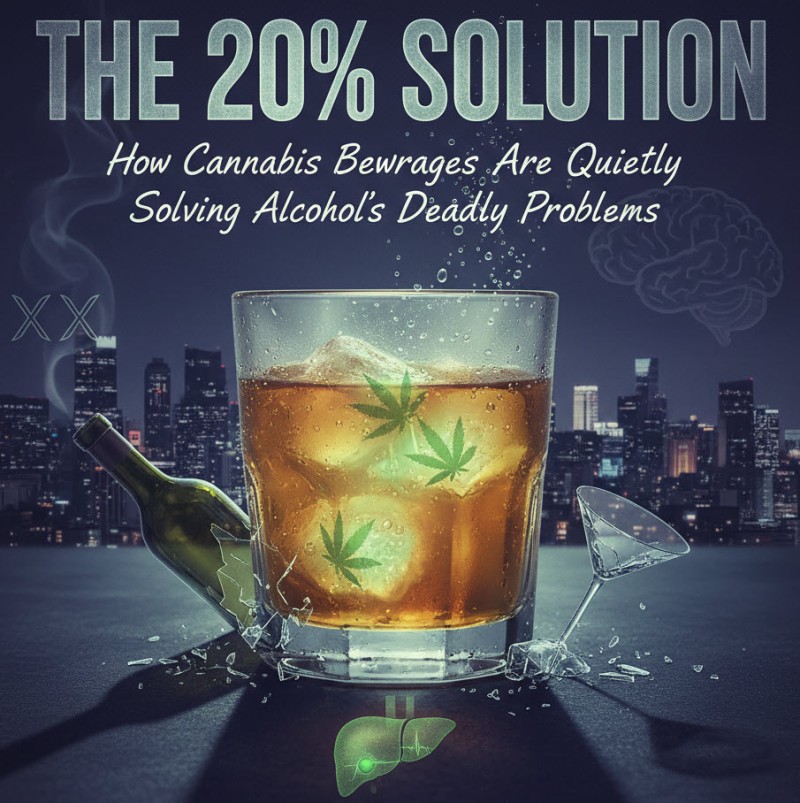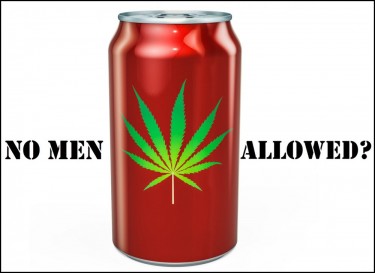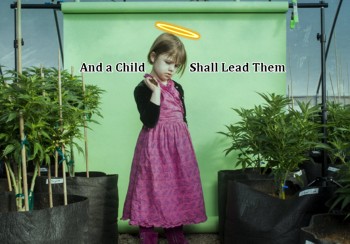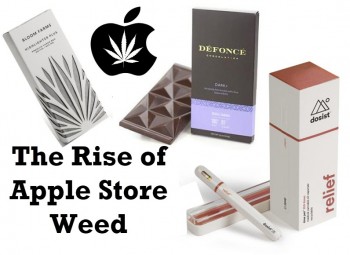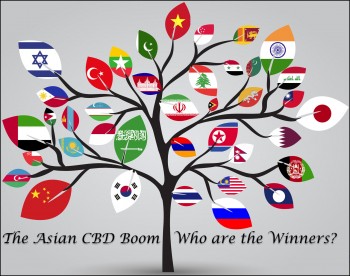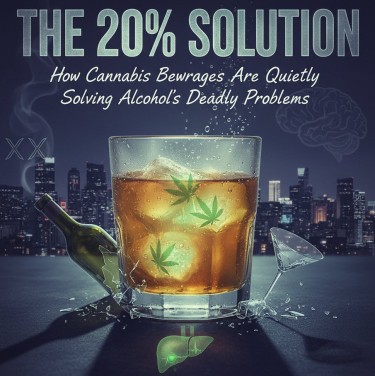
I'll admit it – I'm not a fan of THC beverages. The one time I tried them, the experience wasn't great. The onset felt weird, the duration was unpredictable, and frankly, I'd rather just smoke a joint. But here's the thing: my personal preferences don't matter when we're talking about data that could represent one of the most significant public health developments in decades.
A new survey shows that people who drink THC-infused cannabis beverages are significantly reducing or eliminating their alcohol consumption. According to the data, regular cannabis beverage consumers report drinking 44% less alcohol than before they started using these products. Even more striking: 20% of cannabis beverage users have stopped drinking alcohol entirely.
Let that sink in for a moment. We're watching a voluntary mass substitution away from one of society's most destructive legal drugs toward a significantly safer alternative. And it's happening organically, driven by consumer choice rather than government intervention or public health campaigns.
To understand why this matters, we need to talk about alcohol's actual impact on society – something we tend to gloss over because alcohol is so culturally embedded that we've normalized its carnage.
The Alcohol Problem Nobody Wants to Acknowledge
Professor David Nutt, one of the UK's leading drug researchers, created a comprehensive harm scale ranking drugs based on harm to users and harm to others. His research, published in The Lancet, found that alcohol is the most harmful drug overall when you account for both individual and societal damage. More harmful than heroin, crack cocaine, or methamphetamine when you factor in violence, accidents, health costs, and social disruption.
Let's examine alcohol's actual body count and societal toll:
Violence and Crime: Alcohol is present in approximately 40% of violent crimes, including homicides, assaults, and sexual assaults. The CDC estimates that excessive alcohol use contributes to 140,000 deaths annually in the United States alone. Think about that – alcohol kills more Americans every year than drug overdoses, and we barely talk about it.
Domestic violence is strongly associated with alcohol consumption, with studies showing that alcohol is involved in 25-50% of domestic violence incidents. The relationship is bidirectional and complicated, but alcohol's disinhibiting effects and its role in escalating conflicts are well-documented.
Traffic Deaths: Despite decades of awareness campaigns and stricter DUI laws, alcohol remains involved in about 31% of all traffic fatalities in the U.S. That's roughly 13,000 deaths per year – every year – from drunk driving alone. And these numbers have remained stubbornly persistent despite massive enforcement efforts and cultural shifts.
Health Impacts: Chronic alcohol use causes liver disease, cardiovascular problems, several types of cancer, pancreatitis, and neurological damage. The WHO estimates that alcohol contributes to 3 million deaths worldwide annually through these health impacts. It's literally a toxic substance that we've collectively decided to normalize because humans have been drinking it for thousands of years.
Economic Costs: The CDC estimates that excessive alcohol use costs the U.S. economy $249 billion annually when you factor in healthcare costs, lost productivity, criminal justice expenses, and other impacts. That's $249 billion every single year being funneled into managing alcohol's consequences.
Addiction and Dependency: Approximately 14.5 million Americans have alcohol use disorder – a rate far higher than cannabis use disorder despite cannabis having more users. Alcohol withdrawal can be fatal, unlike cannabis withdrawal which is uncomfortable but never life-threatening.
Now, imagine reducing all of these harms by 20%. Not through prohibition, not through taxation, not through awareness campaigns – just through people voluntarily choosing a less harmful alternative that they actually enjoy.
What a 20% Reduction Actually Means
If THC beverages help 20% of drinkers stop consuming alcohol entirely, and another significant percentage reduce consumption by 44%, the public health implications are staggering.
Lives Saved: A 20% reduction in alcohol-related deaths would mean approximately 28,000 fewer deaths annually in the U.S. alone. That's 28,000 families not destroyed, 28,000 funerals not held, 28,000 lives not cut short by a legal drug we sell in grocery stores.
Violence Reduction: If 20% of violent crime involves alcohol, and 20% of drinkers stop drinking, we're looking at potential reductions of thousands of homicides, tens of thousands of assaults, and countless domestic violence incidents. Even a modest 10% reduction in alcohol-related violence would represent a massive public safety improvement.
Traffic Safety: A 20% reduction in drunk driving deaths would save approximately 2,600 lives per year on U.S. roads. That's roughly seven people every single day who wouldn't die in alcohol-related crashes. Over a decade, that's 26,000 lives – the population of a small city.
Economic Impact: Reducing alcohol's economic toll by 20% would free up approximately $50 billion annually. That's money that could be redirected to healthcare, education, infrastructure, or simply remain in families' pockets rather than being consumed by alcohol's collateral damage.
Healthcare System Relief: Fewer alcohol-related emergency room visits, fewer liver transplants, fewer cancer treatments for alcohol-related cancers, fewer cardiovascular interventions. The healthcare system savings alone would be enormous, and this doesn't even account for the reduction in chronic disease burden and improved quality of life for millions of people.
Criminal Justice Savings: Fewer DUIs mean less strain on courts, fewer people in jail for alcohol-related offenses, reduced probation caseloads. The criminal justice system could redirect resources toward actual public safety threats rather than managing the endless stream of alcohol-related incidents.
The numbers are so large they almost become abstract. But behind every statistic is a real person who didn't die, a family that wasn't torn apart, a child who didn't grow up with an alcoholic parent, a victim who wasn't assaulted, a driver who didn't kill someone on their way home.
Why Cannabis Beverages Work Where Other Interventions Failed
What makes this substitution effect so powerful is that it's voluntary and market-driven. People aren't being forced to switch from alcohol to THC beverages through taxation, regulation, or moral crusading. They're choosing it because they prefer the experience.
This is crucial because decades of public health campaigns, sin taxes, and awareness programs have had limited success in reducing alcohol consumption. People know alcohol is dangerous – everyone knows drunk driving kills, everyone knows alcohol can destroy your liver, everyone has seen the consequences. But they drink anyway because alcohol provides something they value: relaxation, social lubrication, stress relief.
THC beverages offer similar effects – relaxation, social enjoyment, stress reduction – without alcohol's unique toxicity. They don't cause hangovers, they're not physically toxic to organs, they don't make people aggressive or violent, and they're far less likely to impair judgment in ways that lead to dangerous decisions.
The survey data showing 44% reduced alcohol consumption among cannabis beverage users suggests these aren't just complete substitutions – people are also moderating their overall intoxicant use. Instead of drinking five beers, maybe they have two beers and one THC beverage. That reduction alone represents significant harm reduction even if they're not quitting alcohol entirely.
Compare this to traditional addiction treatment approaches, which have notoriously low success rates for alcohol use disorder. AA has success rates of maybe 5-10% depending on how you measure. Pharmaceutical interventions like naltrexone help some people but have limited uptake and effectiveness. Meanwhile, THC beverages are achieving 20% complete cessation rates just by offering a preferable alternative.
The Personal Experience: Why My Opinion Doesn't Matter
Here's where I need to acknowledge my initial bias. When I tried a THC beverage, I didn't love it. The onset took longer than I expected, the peak felt different from smoking or edibles, and the overall experience wasn't as controllable as other consumption methods I prefer.
But so what? My personal preference is irrelevant to the public health question. If millions of people are finding that THC beverages work better for them than alcohol, and they're voluntarily switching to a demonstrably safer substance, then my taste preferences don't factor into the equation at all.
This is actually a perfect example of how personal experience can cloud judgment about broader policy questions. I don't like THC beverages, therefore I'm tempted to dismiss them as a gimmick. But the data showing alcohol reduction among users is compelling regardless of my individual response to the product.
It's also worth noting that THC beverages represent a specific use case that serves a particular demographic. These aren't products for daily cannabis users who already have preferred consumption methods. They're for people who currently drink alcohol socially, who want to participate in social drinking culture without alcohol's downsides, who are looking for measured, predictable doses in a familiar format.
The craft cannabis beverage industry is developing products with different onset times, different cannabinoid profiles, different flavors and experiences. Some use nano-emulsion technology for faster onset. Others combine THC with CBD or other cannabinoids for different effect profiles. The market is innovating to serve different preferences and use cases.
Will I personally start drinking THC beverages regularly? Probably not – I have consumption methods I prefer. But will I support their availability and celebrate their role in reducing alcohol harm? Absolutely. Because this isn't about my preferences – it's about public health outcomes.
What This Means for Policy
The emergence of THC beverages as a voluntary alcohol substitute should be celebrated and supported by policymakers serious about public health. Instead of fighting cannabis legalization, health departments should be studying how to accelerate this substitution effect.
We should be researching optimal dosing for social use, developing clear labeling standards, ensuring product safety and consistency, and creating regulatory frameworks that allow these products to compete with alcohol on even footing. That means reasonable taxation, access through normal retail channels, and marketing that can communicate product benefits.
Currently, cannabis products face advertising restrictions that alcohol doesn't, taxation rates that far exceed alcohol, and distribution limitations that privilege existing alcohol retailers. If we're serious about harm reduction, we should be making the safer alternative more accessible and affordable, not maintaining artificial barriers that protect the alcohol industry.
The survey data showing reduced alcohol consumption among THC beverage users is just the beginning. As these products improve, as social acceptance grows, as more people discover they prefer the effects of cannabis to alcohol, we could see even larger substitution effects. That 20% figure could grow to 30%, 40%, or higher as the market matures and products improve.
Every percentage point of reduction in alcohol consumption translates to thousands of lives saved, billions in economic savings, and immeasurable improvements in public health and safety. Even if you don't personally enjoy THC beverages, even if you think they're a gimmick, even if you prefer other consumption methods – the data suggests they're quietly solving one of society's deadliest problems.
That's worth celebrating, supporting, and expanding. Because at the end of the day, public health policy should be about outcomes, not preferences. And the outcome here is clear: cannabis beverages are helping people drink less alcohol, and that's an unambiguous win for everyone.

